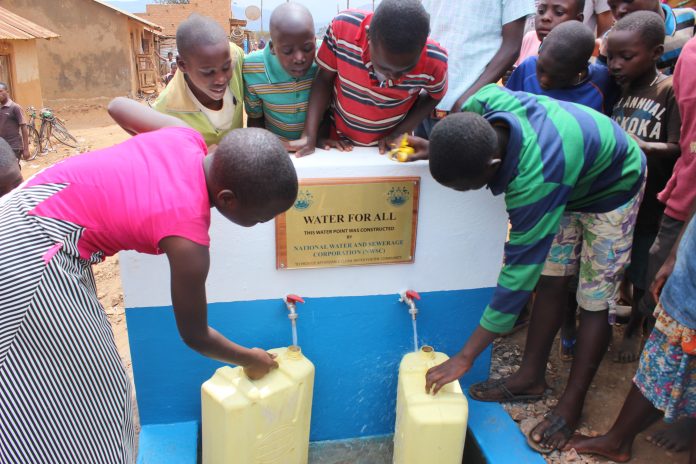Millions of Africans still suffer from water shortages throughout the year. In Sub-Saharan countries, the situation is worse, nearly 51 percent (300 million people) lack access to supply of safe water and 41 percent lack adequate sanitation. The challenges to Africa’s future as far as water is concerned cannot be successfully addressed by adherence to business as usual in water resources management at all levels.
National Water and Sewerage Corporation (NWSC)–a public utility that is 100 percent owned by the government of Uganda–is one of Africa’s well performing water utilities. The Corporation has challenged the status-quo by thinking out of the box, adopting new and sometimes daring innovative approaches to ensure universal access to safe and affordable drinking water for all. NWSC has set itself a very ambitious target of achieving 100 percent service coverage by 2021 under the strategic theme of WATER FOR ALL.
The corporation has implemented a series of pragmatic and innovative interventions to accelerate the achievement of water for all. These include: a systematic and quite aggressive expansion of the geographical coverage that resulted in an increase of the number of NWSC service towns from 24 to 225 towns across the country in the space of just 4 years. There has also been a massive infrastructure growth with an annual average of 1,200 kilometres of water pipe network extended across the country compared to an annual average of only 80 kilometres that used to be extended.
One of the biggest challenges facing most water utilities in developing countries is the high level of Non-Revenue Water (NRW). The corporation initiated a pro-active community-based illegal use reduction programme–WALOPU (Water Loss Prevention Unit)–where the corporation partnered with the police and community to fight illegal water use and reduce NRW. In addition, more emphasis was put on improved engagement with communities to minimise the challenges of inadequate physical planning, catchment protection and customer service. Water Community Communication (WACOCO) Clubs, and Water Baraza have been introduced in order to improve communication with the communities and also to gain feedback on NWSC services. Social media, which in the context of NWSC is referred to as “social care”, has also been adopted as a powerful tool to drive customer delight and loyalty, and in many cases better revenue performance.
A Water Fund was established purposely to facilitate safe water access to low-income areas. The main contributors to the Fund are the rich and closer access to the network has significantly benefited the poor.
The Corporation has in place a strategic infrastructure development plan that will secure the future water demand and there are a number of major projects being implemented by the corporation across the country. Various necessary adaptation measures that deal with climate change have also been implemented to create resilience to climate change and to enhance water security. Some of the measures include: i) introducing new efficient technologies–for example use of solar energy and innovative waste to energy solutions, (ii) restoration of wetlands, and implementation of a nationwide one million tree planting campaign to ensure source protection and secure long-term water supply.
Key to making Water for All a reality is having the level and type of financing required for the new infrastructure and rehabilitations. NWSC is able to finance 100 percent of its recurrent budget and about 40 percent of capital budget through user fees/internally generated funds. The strategy is to grow the revenue base to be self-financing in future and where necessary explore innovative commercial/private financing–including commercial loans and bond financing.
Moving forward, the Corporation intends to keep challenging the status-quo and ensure WATER FOR ALL is achieved by 2021.









